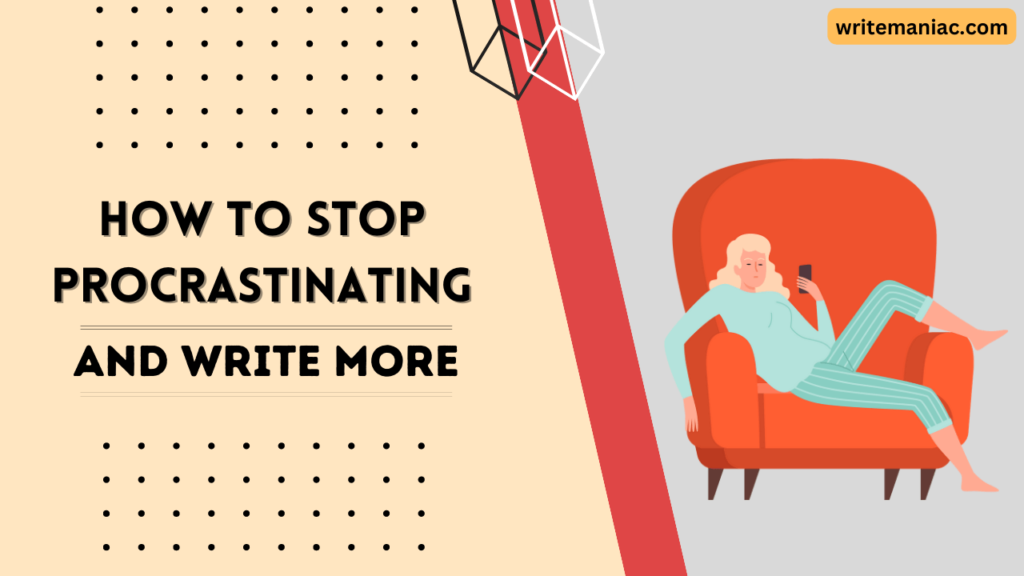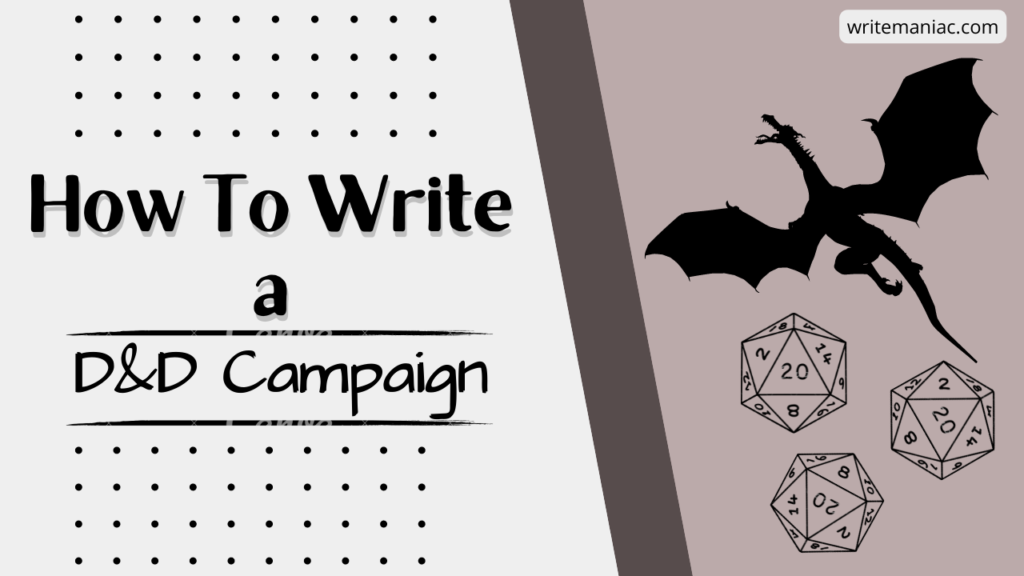
Have you ever had this problem where you want to write a lot but end up wasting your time? Well, you are not alone.
There are a lot of writers who feel that way and suffer from procrastination. In this article, I’ll discuss how to stop procrastinating and write more.
Well, I think procrastination is one of the most common enemies of a writer. When I started writing a few years back, this was the biggest problem.
I used to procrastinate a lot. You know I would find excuses to push back the time to start writing, which messed up my writing schedule. Most often I was distracted by YouTube videos, games, and social media.
Your mind wants to wander off. It wants to delay the time of starting your writing. This is the problem of procrastination. To get out of this you’ll need a lot of motivation and a little push.
You know, when I started writing again and got into the flow, my procrastination used to go away on its own. You just have to start writing. Just push yourself to start—even if you don’t feel like doing it.
When you start writing and get used to it, a writing flow will automatically develop and you’ll forget that you had procrastinated before starting writing. I was able to form this habit in me—you can too. But a lot of practice and patience is needed to achieve it.
You have to write constantly and consistently—you know, success doesn’t come that easily. Well, I have gathered some of the ways that I use to stop procrastinating and write more. But before that let’s understand why we procrastinate.
Why We Procrastinate
Procrastination occurs mainly because of low confidence and anxiety in most people. Laziness and low motivation make you more vulnerable to developing this.
Perfectionism is another reason. Some people want their writing to be the most perfect and accurate work ever, this can cause them to delay because they never find the perfect time to actually start writing.
Even sometimes, negative thoughts like not being able to complete your task, and other distractions can cause procrastination—this was exactly the reason why I used to procrastinate a lot as a beginner writer.
Now, let’s find out how to stop procrastinating and write more:
1. Make a Now or Never Mindset

This can be a great way to deal with procrastination. This mindset can help to create a sense of urgency and to motivate you to take action. What I meant by this is well, with procrastination the problem is more like starting writing or the work.
If you can completely ignore that by setting this mindset and start working immediately you can trick your brain with the bad and lazy temptation of procrastination.
A great way to develop this kind of mindset can be to visualize the consequences of not taking action. This can help you to take action to avoid those negative consequences.
For example, imagine the disappointment you would feel if you didn’t finish a writing project on time or the regret you would feel if you didn’t take advantage of a writing opportunity. It’s a great way to trick your mind and actually start writing.
This mindset worked like a charm for me in the earlier days of my writing career and I hope it will help you too.
2. Set Small and Achievable Writing Goals
Setting small and achievable writing goals can be an effective way to stop procrastination. By breaking down larger writing projects into smaller, manageable tasks, you can make the task of writing feel less tiresome and thus make it easy to start writing.
The Pomodoro technique is a great way to accomplish this. I personally used this technique and found it helpful.
You know, if there is a huge task in front of you, you would feel anxious and get worried which can make you procrastinate. So don’t set a big goal like—”I will write a full 5000-word blog post today”. Instead, set smaller goals like—”I will write 500 in the next 1 hour” Then you can take a little break and continue again.
You can also reward yourself for completing small goals every once in a while. This will keep you motivated to write more.
This technique will go a long way to help you achieve a good habit of constant writing. I feel greatly motivated if I am able to complete every small goal I set for the day.
3. Write Other Things You Like
You are probably wondering how would it work if you’re actually suffering from writing procrastination. But this is a great way to overcome procrastination. Write anything you love—poems, stories, articles, essays, diary entries. Just make yourself start writing.
This will create a writing habit when you start procrastinating. It can be a great way to stop your writing procrastination. Well, it’s kind of like you are getting rid of writing procrastination by doing what you love—in this case writing about what you love.
Think about what you do to delay your writing, things like watching YouTube, surfing the internet, and social media right? With this technique you are not actually delaying your writing, I think the idea is somehow simple here.
4. Create a To-Do List and Plan Ahead

Creating a to-do list can be very helpful if you are procrastinating. This will help you to organize your tasks, prioritize them, and stay on track.
One way to create a to-do list is by using a planner or calendar to schedule your writing tasks. This can help you to create a daily or weekly schedule for your writing and to stay on top of your tasks. By seeing your writing tasks laid out in front of you, it’s easier to stay motivated and focused on the task at hand.
I use the Todoist app to create my to-do lists. There are other apps like Trello, Asana, and Google Tasks that you can use to your advantage as well.
Planning ahead can help you to anticipate potential obstacles and to create a plan to overcome them.
For example, if you know that you’re likely to be distracted by social media, you can plan to turn off your phone or use an app that blocks distracting websites during your writing sessions. I always try to minimize distractions when I’m writing. Just get a cup of coffee and start writing, put your phone to charge, or keep it at a distance.
5. Create an Outline of Your Writing
If you are writing a big article then don’t go into writing blindly. Create a quick outline and structure what you want to write.
I like to quickly write the introduction first and then I summarize all my H2/H3 headlines. After that, I go into the detail of each headline and write small paragraphs. Just see this article as an example.
You can use something like mind mapping or brainstorming all the ideas on one page. Write your first draft very quickly, then go on with the nitty-gritty details.
This way you won’t lose track of what you are writing. The headline tags will help you guide your writing as well.
It’s also important to remember that an outline is not set in stone, it’s a flexible guide that can be adjusted as you work on your writing.
6. Just Start
One of the biggest problems of procrastinators is that they just won’t find the willpower to start the work they plan to do. Starting is the hardest part, as I’ve mentioned in the first point. After starting, everything becomes much easier.
I want you to think about Chemistry for a bit. Well, in Chemistry every reaction needs activation energy. It is the minimum energy needed to start a reaction. After the activation energy is gained the reaction easily happens and even continues without any problem.
Well, I think procrastinators also need a bit of activation energy to be able to start their work. As a writer, we need to stay motivated and confident in our writing.
Just keep this in mind—whenever you feel like you are procrastinating or delaying your writing, just stop immediately whatever you are doing. Move for a bit, do some exercises, and get back to writing—don’t give your mind the time to wander off. Once you start, the momentum will help you continue writing more.
Some FAQs about procrastinating
Here are some FAQs about procrastinating and their answers:
How Do I Stop Being Lazy and Procrastinating?

Well, I’ve discussed the methods I use to overcome procrastination in writing. Here are some of the key points to follow:
- Identify the root cause
- Make a now-or-never mindset
- Break tasks down into smaller chunks
- Reward yourself for accomplishing tasks
- Eliminate all kinds of distractions
- Create a routine and to-do list
- Stay motivated and practice mindfulness
Why Am I Afraid To Finish Things?
There can be many reasons why you might be afraid to finish things. Here are some of the common reasons:
- Fear of failure
- Perfectionism
- Low-confidence
- Fear of the responsibilities that comes with success
- Negative thoughts
Conclusion
In conclusion, procrastination can be a major obstacle for many writers, but it’s something that can be overcome with the right strategies and methods. I’ve tried to explain the methods of how to stop procrastinating and write in this article.
It’s important to remember that change doesn’t happen overnight. I was struggling at the beginning. However, as time went by, I practiced these methods and made myself not fear procrastination anymore.
It will take time and patience to break the habit of procrastination. You have to write regularly and consistently to make it more of a habit so you won’t have to push yourself to write anymore—you will automatically start writing at your leisure.
Remember that you are capable of achieving your goals and don’t give up on them. Be kind to yourself and remember that progress is progress, no matter how small.
Good luck on your writing journey and overcoming procrastination as a writer. Thanks for reading.
You might be interested to read these articles on various writing tips:





